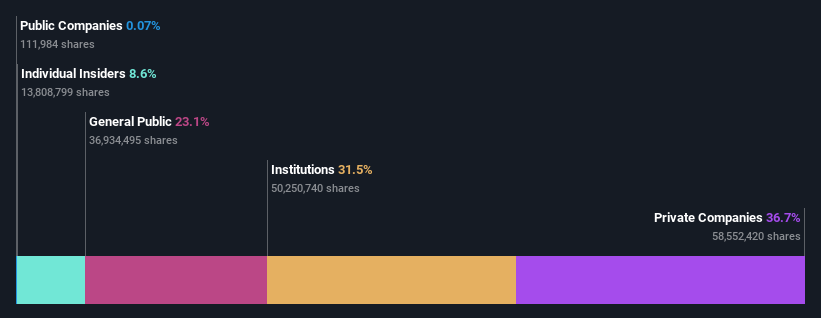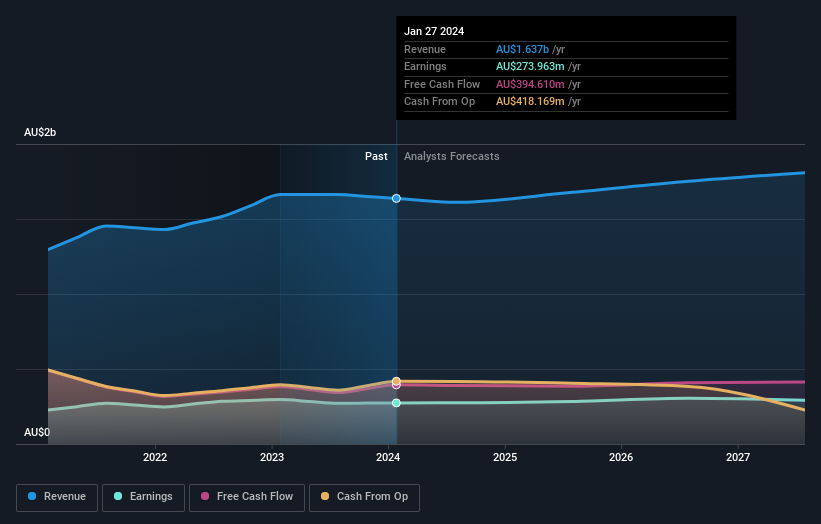- Australia
- /
- Specialty Stores
- /
- ASX:PMV
Premier Investments Limited's (ASX:PMV) 5.9% loss last week hit both individual investors who own 37% as well as institutions

Key Insights
- The considerable ownership by private companies in Premier Investments indicates that they collectively have a greater say in management and business strategy
- 53% of the business is held by the top 3 shareholders
- 31% of Premier Investments is held by Institutions
To get a sense of who is truly in control of Premier Investments Limited (ASX:PMV), it is important to understand the ownership structure of the business. The group holding the most number of shares in the company, around 37% to be precise, is private companies. Put another way, the group faces the maximum upside potential (or downside risk).
While the holdings of private companies took a hit after last week’s 5.9% price drop, institutions with their 31% holdings also suffered.
Let's take a closer look to see what the different types of shareholders can tell us about Premier Investments.
Check out our latest analysis for Premier Investments

What Does The Institutional Ownership Tell Us About Premier Investments?
Many institutions measure their performance against an index that approximates the local market. So they usually pay more attention to companies that are included in major indices.
As you can see, institutional investors have a fair amount of stake in Premier Investments. This suggests some credibility amongst professional investors. But we can't rely on that fact alone since institutions make bad investments sometimes, just like everyone does. It is not uncommon to see a big share price drop if two large institutional investors try to sell out of a stock at the same time. So it is worth checking the past earnings trajectory of Premier Investments, (below). Of course, keep in mind that there are other factors to consider, too.

Hedge funds don't have many shares in Premier Investments. Century Plaza Investments Pty. Ltd. is currently the company's largest shareholder with 37% of shares outstanding. In comparison, the second and third largest shareholders hold about 8.3% and 7.9% of the stock. Solomon Lew, who is the third-largest shareholder, also happens to hold the title of Chairman of the Board.
To make our study more interesting, we found that the top 3 shareholders have a majority ownership in the company, meaning that they are powerful enough to influence the decisions of the company.
While it makes sense to study institutional ownership data for a company, it also makes sense to study analyst sentiments to know which way the wind is blowing. There are plenty of analysts covering the stock, so it might be worth seeing what they are forecasting, too.
Insider Ownership Of Premier Investments
The definition of an insider can differ slightly between different countries, but members of the board of directors always count. The company management answer to the board and the latter should represent the interests of shareholders. Notably, sometimes top-level managers are on the board themselves.
I generally consider insider ownership to be a good thing. However, on some occasions it makes it more difficult for other shareholders to hold the board accountable for decisions.
Our most recent data indicates that insiders own some shares in Premier Investments Limited. The insiders have a meaningful stake worth AU$464m. Most would see this as a real positive. It is good to see this level of investment by insiders. You can check here to see if those insiders have been buying recently.
General Public Ownership
The general public, who are usually individual investors, hold a 23% stake in Premier Investments. While this size of ownership may not be enough to sway a policy decision in their favour, they can still make a collective impact on company policies.
Private Company Ownership
Our data indicates that Private Companies hold 37%, of the company's shares. It's hard to draw any conclusions from this fact alone, so its worth looking into who owns those private companies. Sometimes insiders or other related parties have an interest in shares in a public company through a separate private company.
Next Steps:
It's always worth thinking about the different groups who own shares in a company. But to understand Premier Investments better, we need to consider many other factors.
I always like to check for a history of revenue growth. You can too, by accessing this free chart of historic revenue and earnings in this detailed graph.
But ultimately it is the future, not the past, that will determine how well the owners of this business will do. Therefore we think it advisable to take a look at this free report showing whether analysts are predicting a brighter future.
NB: Figures in this article are calculated using data from the last twelve months, which refer to the 12-month period ending on the last date of the month the financial statement is dated. This may not be consistent with full year annual report figures.
New: Manage All Your Stock Portfolios in One Place
We've created the ultimate portfolio companion for stock investors, and it's free.
• Connect an unlimited number of Portfolios and see your total in one currency
• Be alerted to new Warning Signs or Risks via email or mobile
• Track the Fair Value of your stocks
Have feedback on this article? Concerned about the content? Get in touch with us directly. Alternatively, email editorial-team (at) simplywallst.com.
This article by Simply Wall St is general in nature. We provide commentary based on historical data and analyst forecasts only using an unbiased methodology and our articles are not intended to be financial advice. It does not constitute a recommendation to buy or sell any stock, and does not take account of your objectives, or your financial situation. We aim to bring you long-term focused analysis driven by fundamental data. Note that our analysis may not factor in the latest price-sensitive company announcements or qualitative material. Simply Wall St has no position in any stocks mentioned.
About ASX:PMV
Premier Investments
Operates various specialty retail fashion chains in Australia, New Zealand, Asia, and Europe.
Flawless balance sheet established dividend payer.


